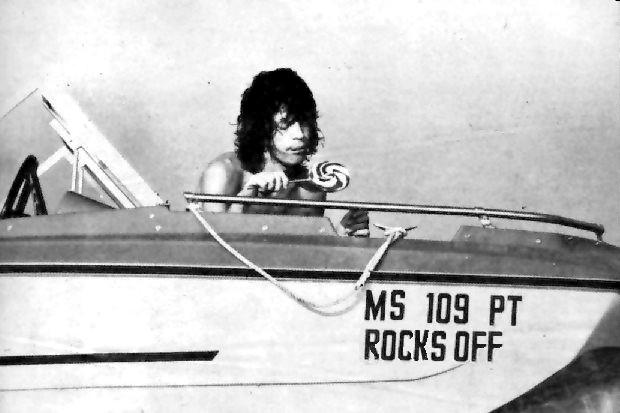|
|
| Soldatti |
Big Stores Make Exclusive Music Deals
Posted by carla60626 in Industry News on January 19, 2004 at 11:06 AM
Printable Version
Big Stores Make Exclusive Deals to Bring in Music Buyers
By IAN AUSTEN
Serious record collectors generally do not flip through the CD's and DVD's at Wal-Mart, Best Buy or Target. The music departments in those stores are mainly known for offering a narrow selection of chart toppers.
But increasingly mass merchandisers and electronics retailers have become the place to go for music that cannot be found anywhere else. That is because many big name artists with new releases to promote, do not just turn to their labels, they also strike exclusive deals with major retailers.
In this holiday shopping season, for example, an extended version of Rod Stewart's new CD, "As Time Goes By . . . The Great American Songbook Vol. II" is available only at Target; Wal-Mart has an exclusive special release of Britney Spears' new CD with links to additional tracks online; and a Rolling Stones concert DVD is only sold at Best Buy. Earlier, Target offered a $7 Bon Jovi CD featuring some live and acoustic versions of songs from "Bounce." The full album was released widely to retailers at the same time.
Exclusive deals have not been restricted to brick-and-mortar retailers. Amazon.com customers who bought "Afterglow" by Sarah McLachlan before its release could immediately listen to some of its songs through a system on Amazon's Web site. Now that the CD is available, Amazon customers who buy it have exclusive Web access to remixes of some of Ms. McLachlan's songs.
The exclusive deals are being offered as mass marketers are seeing their share of the music business grow. Discount stores like Wal-Mart accounted for only 13.5 percent of music sales in 1994, said Clark Benson, the chief executive of the Almighty Institute of Music Retail, a Los Angeles-based company that sells data about retailers to record labels. This year the figure is 34.8 percent. Billboard and its corporate sibling Nielsen SoundScan lump electronics chains like Best Buy and Circuit City with traditional music stores. Adding their sales to the other mass marketers would probably raise that group's total to more than 50 percent, said Geoff Mayfield, the director for charts and senior analyst at Billboard.
For the retailers, the deals are as much about using the artists' appeal to lure customers as they are about selling CD's and DVD's. For the musicians, the deals are less about sales than about promotional campaigns well beyond anything offered by record companies even in their glory days.
For example, Target promoted its exclusive seven-song Bon Jovi CD with an extensive television campaign. In the 30-second spot - which cost $1 million to produce, the band's management said - snippets from a studio performance of a song on Bon Jovi's new full-priced CD were intercut with footage of band members chatting about the meaning of the song. Best Buy started a similarly ambitious television campaign for its Rolling Stones DVD set last month.
"If you look at the Target commercial, that's an ad for Bon Jovi and they just stuck their little circle on at the end," said Bruce Kirkland, one of the two principals at Bon Jovi Management. "The key for us really was being included in the ad. The budgets big retailers have are budgets record companies don't have."
Not surprisingly, the exclusive arrangements irritate other music retailers, particularly independent and regional operators who lack the power and money to cut deals.
"To me it's obnoxious," said Michael Dresse, chief executive officer of Newbury Comics, a 24-store chain in New England. "We're kind of being picked off, one artist at a time, by the mass merchandisers who aren't interested in music. They just want to use the power of a band to drive more feet through their doors."
Further market concentration tends to favor popular performers, like the Rolling Stones and Bon Jovi, who act as a magnet for buyers over emerging or controversial acts. "Being a small act has never been easy," Mr. Mayfield said. "But if you're a starting act, you don't want to be in Wal-Mart. You'll get lost there."
In the United States some retailers, including Albany-based Trans World Entertainment which has 940 stores protested Best Buy's arrangement with the Rolling Stones by substantially cutting the number of titles by the band that it stocked. The reaction in Canada has been even more intense. Several large chains have boycotted Rolling Stones products.
"If we're not good enough to have all the products from the Stones, then we won't have their catalog in our stores," said Humphrey Kadaner, president of HMV North America, whose 100 outlets in Canada removed all Rolling Stones products. "The only method we have to influence the Stones is to impact their royalties stream," Mr. Kadaner said.
After starting its protest last month, HMV Canada tried to make a deal with TGA Entertainment of Toronto. Failing that, it asked Canadian competition regulators to investigate the arrangement with Best Buy. On Dec. 18, Canada's Competition Bureau announced that the exclusive deal did not break any laws.
Michael Cohl, who is chairman of TGA and has been the tour manager for the Rolling Stones, dismissed Mr. Kadaner's contention that the Rolling Stones are acting unfairly. "Give me a break," Mr. Cohl said. "This idea that there's only one way to distribute product and it has to be the industry's rules is as anticompetitive an idea as there is."
"Once you make the decision to sell a new product you have to ask yourself: Has the traditional method done everything possible for artists?" he said. "The answer is that of course you should consider all things."
Gary Arnold, the senior vice president for entertainment at Best Buy said the value of such deals became obvious in 1995 and 1996 during the release of the ''Beatles Anthology,'' three double albums. At that time, Best Buy struck a deal to package additional material, like photographs and archival interviews with the band members, with each CD. The result, Mr. Arnold said, was that Best Buy sold more copies of the recordings than any other retailer in the United States. "It showed that it's not all about price to consumers," he said.
Mr. Cohl and Mr. Arnold came together because of a decision by the Rolling Stones in their last concert tour. They were frustrated by the lack of promotional attention given to music DVD's. "Music DVD's have been handled as an afterthought,'' Mr. Cohl said. "They're the Rodney Dangerfields of the music industry."
At the end of their tour, the Rolling Stones produced an unusually long four-disc DVD package titled "Four Flicks" and charged TGA Entertainment, Mr. Cohl's company, with finding a retail partner.
Only Best Buy provided Mr. Cohl with what he was seeking, a retailer who was also willing to manufacture and distribute the discs. "We looked for the excitement in their voices and the gleam in their eyes," he said. "It was no contest."
The set is priced at an exceptionally low $30. The suggested price for the set in England, where it is distributed by Warner Music to all retailers, is £50 ($89).
Mr. Arnold acknowledged that exclusive music deals help lure additional customers into Best Buy stores. "We know that a consumer, on a given shopping day, has a lot of alternatives for where they want to go." He insists that the unique content of the recordings, not their low prices, is driving the process.
Little economizing was apparent when it came to promotion. While neither party would discuss details of the arrangement, Mr. Cohl said that Best Buy's commitment to advertising the set in print advertisements and in-store displays is measured in "many millions of dollars for marketing,'' far beyond that of its usual music marketing. "It's what I would imagine the marketing budget is for a major feature film release on DVD," he added.
Mr. Mayfield of Billboard, agreed that Best Buy's effort has been extraordinary.
"They were eye-catching ads, and the overwhelming message was that Best Buy has this video," he said.
The sales results have been similarly exceptional, he added. From its release in mid-November until late the week before last, Four Flicks sold 155,000 copies in the United States. By contrast, the Rolling Stones' previous concert DVD, "Bridges to Babylon," sold just 24,000 copies in the same period after its release. And its total sales after almost five years are 164,000.
A random sampling of some older Rolling Stones CD titles by Mr. Mayfield suggests that the exclusive deals may stimulate sales across the board. Sales of Rolling Stones CD's have increased by about 26 percent since Best Buy's campaign started, although such albums may only sell about 1,700 units a week nationwide. Mr. Kirkland of Bon Jovi management said he was confident that the Target campaign not only increased sales of "Bounce," but also increased sales of older Bon Jovi albums at all music retailers. "There was a total sales lift right across the board," he said.
The Rolling Stones deal was unusual because the rights to the DVD rest with the band, not its record label, the Virgin division of Britain's EMI. Frequently record companies are directly, if discreetly, involved in helping to form the alliances between acts and retailers. The Universal Music, the parent company of Bon Jovi's Island Def Jam label, made the initial introduction at Target for the band's management. But Mr. Mayfield said that record companies, and even many retailers, like to keep a low profile about exclusives. Partly at their request, for example, Billboard does not include exclusive music CD's on its charts.
What that market concentration means is a matter of debate. Mr. Mayfield said that mass marketers have always been influential. But people looking for recordings from controversial or emerging acts have always gone to specialty shops, a practice he said will continue. Mr. Benson is less sanguine. While music downloading has pressured all parts of the music industry, he said, the sales shift to mass marketers has contributed to record store closings. In the last six months lone, he said, 358 music stores - chain outlets and independents - have shut down.
Exclusive deals will only add to the pressure.
"I can certainly understand why established artists are doing this, but it drives another nail into the coffin of traditional music stores that are already struggling because of music piracy," he said. "Maybe I'm just a romantic about this stuff. But I think the neighborhood record store is an important part of our culture." |
|
|
| corgi37 |
The world is indeed an interesting place. |
|

 CHAT
ROOM aka THE FUN HOUSE] [
CHAT
ROOM aka THE FUN HOUSE] [ RESTROOMS]
RESTROOMS]
